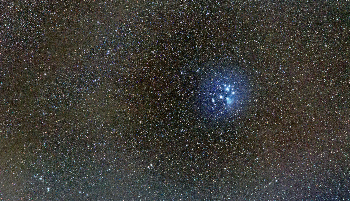|
Stargazing guests reach
for the skies

STARGAZING guests in the Forest of
Bowland can get the most from the night skies thanks to astronomy tips from
an expert. Robert Ince, an astronomer and astrophotographer, runs events at
the Forest of Bowland's premium 'Dark Sky Discovery Sites.' He
offered advice to guests at 3 of hospitality group James' Places Hotels,
which are:- the Shireburn Arms, at Hurst Green, the Falcon Manor Hotel, at
Settle and the Royal Hotel, at Kirkby Lonsdale. All are within 30 minutes
drive of 1 of the Forest of Bowland's several best stargazing sites, Gisburn
Forest Hub, Slaidburn car park and Beacon Fell Visitor Centre. Said Robert
told us that:- "These Dark Sky Discovery Sites are in areas with very
low night pollution, away from street lights and urban glare. The night sky
is fantastic to see and with the right conditions there is so much to
observe."
Robert had the following tips for getting
the most out of a stargazing trip:-
1. Head for a Dark Sky Discovery Site or anywhere reasonably near to 1. Here
you will have the best chance of seeing the most. The Gisburn Forest Hub
site is excellent as it is an open space in the middle of a wooded area and
very dark. The Slaidburn car park site is also close to Gisburn Forest and
being a village is a little more accessible for those who don't want to go
right into the wilds; and it has a pub!
2. Plan with the calendar before you go. The time of year is important as
summer has fewer hours of darkness. Most astronomers at our latitudes don't
venture out during July and August. The best months for stargazing are
between November and April.
3. Check the moon phases. Avoid a full moon as its glare restricts the
amount you will see because of its brightness, size and position in the sky.
4. The weather is crucial. The best conditions are often when the weather is
cold and crisp and the air becomes very clear. When there is moisture in the
air it causes mist and cloud obscuring the view.
5. Let your eyes adjust. Start by simply soaking in the atmosphere, spending
at least 20 minutes to 30 minutes in the darkness allowing your eyes to dark
sky adapt. After this time you will be able to see the Milky Way and galaxy
arching above you and pick out the constellations and patterns in the sky.
6. Don't bring a white light torch. A red light, similar to those now found
on headtorches often used by cyclists is fine. White light will make your
eyes lose the adjustment they had gained but a red light won't affect your
night vision at all.
7. Go when an expert will be on hand to point things out or download an app.
Stargazing is so much more rewarding when you know what you're looking at.
James' Places hotels all have information on when stargazing events are
taking place at the various locations. If you can't make these events, there
are some really good smartphone apps for around 99p or even free which when
pointed at the sky can identify stars and constellations. Recommended ones
include:- Google Sky, Night Sky Pro, StarMap and Stellarium Mobile.
8. There's often no need for a telescope. If you are thinking of getting
into astronomy, 1st buy a decent pair of binoculars, then perhaps consider a
small, portable telescope. Telescopes take some setting up and using them
properly can be a steep learning curve but once achieved is very rewarding.
9. What can be seen? The sky changes with the seasons. At northern
latitudes, the Plough, which is part of the Great Bear, is always there. An
imaginary line drawn between the two right hand stars of the Plough leads up
to Polaris, which is always due North. Orion, the hunter, is best visible in
the spring months and various meteor showers occur throughout the year.
10. Special astronomical events to note this year are the autumn meteor
showers; check out the Bowland Meteors event at Gisburn Forest Hub, on
Friday, 18 November 2016 and the rare transit of Mercury across the Sun, on
6 May 2016, which will only be visible through special telescopes!
Said James' Places hospitality group marketing manager Heidi Kettle:-
"With the 2016 calendar packed with astronomical treats, plus the chance to
wave at astronaut Major Tim Peake as the International Space Station passes
over, we are incredibly lucky here on the edge of the Forest of Bowland to
have such easy access to excellent quality sites for observing the
breathtakingly beautiful night sky."
More information on opportunities for astronomy in the Forest of Bowland is
available
online. |
